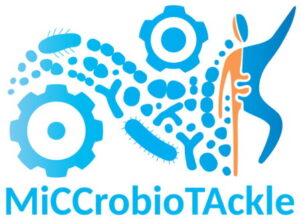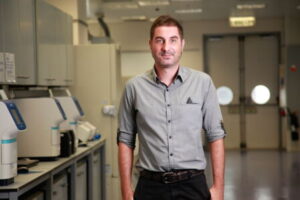Gut microbiome and tumor cachexia: New European research network

In two projects of the new EU consortium, machine learning algorithms and computer-aided metabolic models are to be developed.
Source: Anna Schroll/Leibniz-HKI
EU project “MiCCrobioTAckle” studies the gut microbiome in cancer and promotes young scientists for microbiota medicine.
By Friederike Gawlik

Tumor cachexia is a serious syndrome affecting many cancer patients, who not only lose significant muscle mass and body weight, but also a considerable amount of quality of life and life expectancy. The exact mechanisms of cachexia are still largely unknown, but the intestinal microbiome – the community of billions of microorganisms in the digestive tract – appears to play a central role, as it can trigger inflammation that impairs nutrient absorption and energy metabolism and thus promotes muscle loss.
“MiCCrobioTAckle” (MiCCrobioTackle: Advancing Research at the Intersection Between Gut Microbiota and Cancer Cachexia to Train Europe’s Future Leaders in Microbiota Medicine) aims to investigate these complex interactions between the gut microbiome and the human body in order to find ways of slowing down muscle breakdown.
An international network for the next generation in microbiota medicine
With a budget of over three million euros, the four-year project brings together 24 scientific and industrial partners from twelve countries who now want to ad-vance microbiota medicine. Twelve doctoral researchers will work together across Europe to gain new insights into the relationship between the gut microbiome and tumor cachexia and to be trained as future leaders in science and industry. Academic partners from Germany, Denmark, Ireland, Hungary and the Neth-erlands as well as the Amsterdam-based biotech company Caelus Pharmaceuticals are supporting the research network. The hope is to be able to transfer the findings from tumor-associated cachexia to other metabolic diseases such as diabetes or obesity in the future.

Source: Anna Schroll/Leibniz-HKI
“’MiCCrobioTAckle’ is an important step forward in microbiota medicine,” says Prof. Dr. Gianni Panagiotou, who is coordinating the research consortium. He holds the Chair of Excellence Microbiome Dynamics at the Friedrich Schiller University Jena and heads the department of the same name at the Leibniz-HKI. “Our project combines different expertise from Europe, the UK and the USA with the mission of thoroughly researching and treating metabolic diseases based on cancer cachexia. At the Leibniz-HKI, we will therefore train three doctoral students to become experts in the human gut microbiome. They should later be able to look beyond their own horizons and always keep an eye on the big picture. This is the only way to generate fresh ideas in science.”
Gianni Panagiotou’s team will investigate tumor cachexia primarily using bioinformatic methods. In one project, biological data from patients will be analyzed in order to develop machine learning algorithms to predict the syndrome. In the second project, computer-aided metabolic models will be developed together with Danish partners to design microbial communities in the intestine for therapies against cachexia. In a third project, a clinical study in lung cancer patients will be carried out in collaboration with Hungarian partners, with the goal to find biomarkers that can help estimate the risk of cachexia. Institutes from the USA and the UK are supporting the training of doctoral researchers through workshops and training courses.
With this program, Gianni Panagiotou is adding a strong application-oriented, medical facet to the “Balance of the Microverse” Cluster of Excellence at the University of Jena. The Cluster of Excellence, which is funded by the German Research Foundation (DFG), investigates the complex balance of microbial communities and their interactions with the environment.
“MiCCrobioTAckle” is funded as part of the “Marie Skłodowska-Curie Actions” (MSCA). The MSCAs are considered the European Union’s flagship funding program for the training of doctoral candidates and postdocs and are part of the EU’s Horizon Europe research and innovation funding program. By developing new microbiome-based tools, the project offers a promising perspective for improving the clinical management and quality of life of cancer patients as well as first-class training programs for future scientists.
Wissenschaftliche Ansprechpartner:
Prof. Dr. Gianni Panagiotou
Microbiome Dynamics
Leibniz-HKI
+49 3641 532-1759
gianni.panagiotou@leibniz-hki.de
All latest news from the category: Information Technology
Here you can find a summary of innovations in the fields of information and data processing and up-to-date developments on IT equipment and hardware.
This area covers topics such as IT services, IT architectures, IT management and telecommunications.
Newest articles

First-of-its-kind study uses remote sensing to monitor plastic debris in rivers and lakes
Remote sensing creates a cost-effective solution to monitoring plastic pollution. A first-of-its-kind study from researchers at the University of Minnesota Twin Cities shows how remote sensing can help monitor and…

Laser-based artificial neuron mimics nerve cell functions at lightning speed
With a processing speed a billion times faster than nature, chip-based laser neuron could help advance AI tasks such as pattern recognition and sequence prediction. Researchers have developed a laser-based…

Optimising the processing of plastic waste
Just one look in the yellow bin reveals a colourful jumble of different types of plastic. However, the purer and more uniform plastic waste is, the easier it is to…



